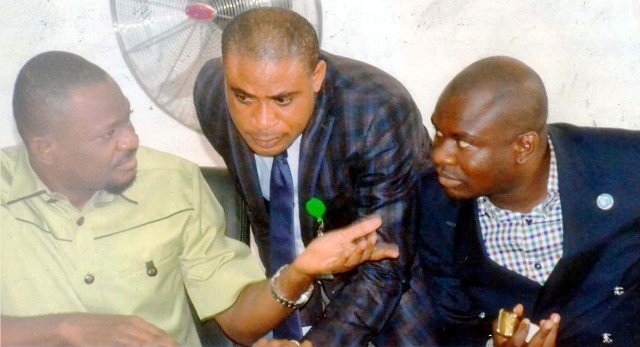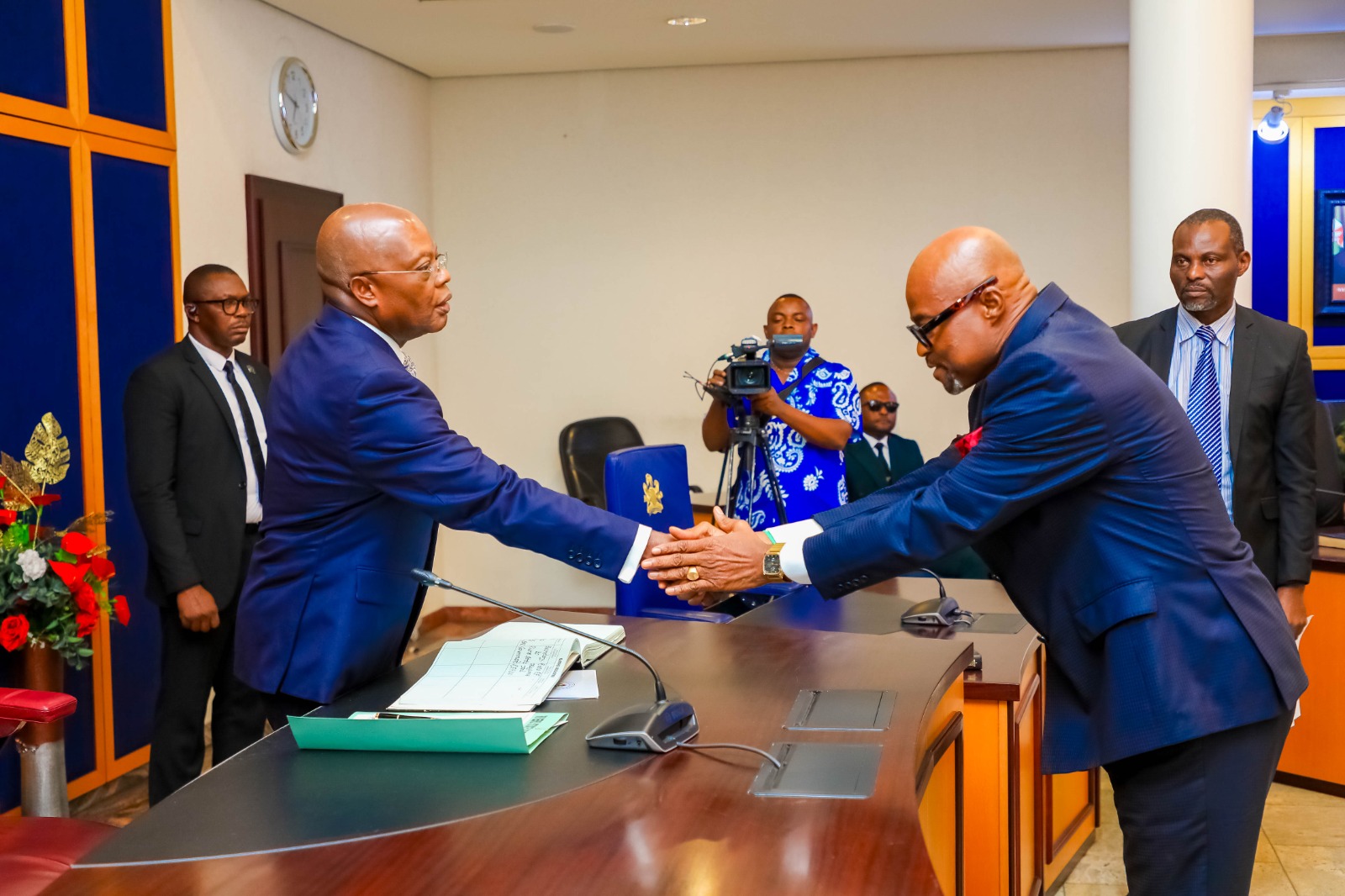Featured
Stakeholders Okay Modular Refineries Plan …Projects Excite Buhari’s Aide

Local refinery operators and some stakeholders in Bayelsa State yesterday commended the proposed liberalisation of modular refineries by the Federal Government to drive development in the Niger Delta region.
Acting President, Prof Yemi Osibanjo, had during his last tour of oil communities announced that the Federal Government would establish modular refineries in the Niger Delta to drive its development strategy for the region. Owner and operator of an artisanal refinery in Bayelsa, Mr. Roland kiente told newsmen that the policy if implemented would transform the economic fortunes of the oil bearing communities in the Niger Delta.
“Those of us currently doing the business are pleased with the proposed plans by the Federal Government.
“We have been advocating for it for long and I have been very vocal in calling on government to come down to our level and assist.
“Our advice, however, is that government should not politicise it, they should identify those who are already in the business and leverage on their expertise also enhance their capacities.
“Those with some kind of experience will be easier to train for the pilot scheme.
“And we shall be more than willing to work with the government to showcase our skills, before now they had branded us illegal and saboteurs.
“But what we are doing is source crude and refine; it is those who sell the crude to us that are involved in illegality.
“Also that has been denting the image of the vocation of local refining; we are driven by entrepreneur instinct to survive.
“There is a big misconception, the artisanal refiners just like the big refineries buy crude from people who get it from illegal sources, so when the government comes in, everything will be formalised.
“With government involvement the revenue will be paid into government coffers rather than individuals who break pipelines to steal crude, it is those persons that are illegal not we that refine and sell’’, Kiente said.
In his reaction, Special Assistant to Bayelsa Governor on Niger Delta Youth Matters, Mr. Kenedy West noted that the modular refinery concept was a novel concept that could transform the Niger Delta region.
“It is a strong answer to eliminate unsafe illegal refineries which are dangerous to our environment.
“The modular refinery is a perfect solution to the dangers of what our people are doing.
“Legitimizing it to make room for small investors, who may not have the capital to build big refineries can build smaller refineries.
“The benefits are so enormous amongst which is increasing the local refining capacity.
“It will organise the local refineries operators into companies and encourage the people of the region to invest in local refining according to the level of their capital under a controlled and regulated framework
“It is wonderful idea that we support but it involves a lot; and we all have to work together to achieve success from it, there is a role for stakeholders,” West said.
An Environmentalist, Mr. Alagoa Morris also applauded the government for acceding to the yearnings of the people but called for the establishment of standards to protect the environment.
He advocated for baseline Environmental Impact Assessment studies by experts and putting in place safety measures prior to establishment of the refineries to ensure they run in an environmentally sustainable manner.
“It is thumbs up to the government and we want the refineries to be driven by the Niger Delta people.
“They should be organised into cooperatives with ownership of shares and incorporation of real companies.
“( “Government should set the standards and enforce; it also should establish formal channels where the operators of the refineries should buy crude officially to check the menace of oil theft.
“The refineries will definitely provide job opportunities and help in tackling the security challenges in the region’’, Morris said.
An Ex-Militant leader, Mr. Ramsey Mukoro who also spoke in favour of the proposed modular refineries, noted that it would provide jobs for the teeming youths in oil communities.
He said that when young minds are meaningfully engaged, they would direct their youthful energies to productive ventures.
Meanwhile, the Special Adviser to the President on Niger Delta, Retired Brig.-Gen. Paul Boroh says the Federal Government planned liberalisation of modular refineries will boost development in the oil rich Niger Delta region.
Boroh, who is also the Coordinator, Presidential Amnesty Programme, assured the people of the region that the proposed modular refineries in oil producing communities would usher in a new era in the Niger Delta region.
Gen. Boroh in a statement made available to newsmen on Saturday in Yenagoa, reiterated the commitment of the President Muhammadu Buhari-led administration to develop the Niger Delta region.
He maintained that the intention to make oil producing communities the hub for refining and related activities would put them in a better position to drive the local economy.
Boroh appealed to the youths to be calm, focused and more articulate in their quest for better living conditions and take advantage of the good gestures of the present administration.
The amnesty coordinator explained that the Federal Government is seeking better ways for Niger Delta people to participate in the development process of the region through meaningful engagements.
According to the amnesty boss, the Federal Government’s new partnership arrangement will bring about an unprecedented infrastructural development in the region.
Boroh commended the Acting President, Prof. Yemi Osinbajo for taking the pains to identify with the people through his tour of the region.
According to Boroh, the planned oil-communities-intervention-meeting by the Federal Government to chart short, medium and long term development blueprint was a strategy to enhance the socio-economic activities in the region.
He expressed the hope that with the proposed coming on stream of modular refineries, the ex-agitators and other youths in the region will be meaningfully engaged in decent jobs.
Meanwhile, the leadership of Phase II ex-agitators in the Niger Delta region in a reaction to the development, applauded President Muhammadu Buhari for demonstrating his sincere wish for the people of the region,
The ex-agitators said that the option of allowing modular refineries to be located in oil bearing communities, speaks volume of the sincere intentions of the present administration towards the Niger Delta youths
Chairman of the Phase II ex-agitators,Mr Salvation Rifus, told newsmen that the tour of the oil communities by the acting president had shown that the Federal Government was committed to development .
He noted that the decision to allow the communities to legally operate modular refineries was the best thing that has happened to the people, describing it as a welcome development.
Featured
Bring Your Wealth Of Experience To Governance, Ibas Tasks New SSG

The Sole Administrator of Rivers State, Vice Admiral Ibok Ete Ekwe Ibas (rtd), has charged the new Secretary to the State Government (SSG), Prof Ibibia Lucky Worika to bring his wealth of experience to bear in governance of the State.
Vice Admiral Ibas (rtd) gave the charge shortly after swearing in the new SSG at the executive chambers of Government House on Wednesday night.
The Administrator who congratulated Prof Worika on his appointment said the choice was not merely an administrative decision but a statement of intent.
Vice Admiral Ibas (rtd) explained that the new SSG has an unparallel expertise in law, policy and international governance, which align perfectly with the mission to restore law, order, integrity and public trust in Rivers State.
He said: “To our new SSG, the task ahead is onerous, but your track record leaves no doubt in our minds that you will prove your mettle. Rivers State needs your intellect, grit and unweaving dedication. Together, we will write a new chapter of progress for this great state.
“Prof Worika’s role will be critical in driving this vision, ensuring that every policy, every decision and every action is in consonance with this administration’s mandate to restore law and order, stabilize the polity and to create the necessary conditions for the restoration of democratic institutions and representations.”
Vice Admiral Ibas (rtd) pointed to his maiden address to Rivers people wherein he emphasised that his administration will be committed to delivering an effective governance that is anchored on transparency, accountability and service.
He therefore, enjoined the new SSG to brace up to the demands of his office, and offer his best service as required while also working cooperatively with civil servants.
Vice Admiral Ibas (rtd) said: “You have no time to settle down. You must roll up your sleeves and get to work with the team.
“Our civil servants with whom we will work closely to run this administration are critical stakeholders and we must work with them to ensure that the state continues to function effectively during this administration.
“To the Permanent Secretaries and civil servants as a whole, once more I will ask your kind cooperation and support as we work to achieve our objectives at this time,” he added.
Featured
I Am One Of You, Sole Administrator Tells Rivers People …Warns Against Violence, Crude Oil Sabotage

The Sole Administrator of Rivers State, Retired Vice Admiral Ibok-Ete Ibas (rtd), has assured residents that he is not in the State as a partisan actor or political competitor but as a stabilising force to restore governance and order.
In a state broadcast yesterday, Ibas, who assumed duty at Government House, Port Harcourt, emphasised his commitment to protecting civil liberties and ensuring the safety of all citizens.
However, he issued a stern warning against crude oil sabotage and violence, urging residents to resist any temptation to return to past hostilities.
“For decades, I have dedicated my life to the service of our great nation—first as the 20th indigenous Chief of Naval Staff and later as Nigeria’s High Commissioner to Ghana. I answered this call out of the need for peace in Nigeria, and most importantly, in Rivers State,” Ibas stated.
Describing the prolonged political impasse as a major setback to governance and democracy, he acknowledged the hardships faced by families and businesses due to the prevailing uncertainty.
“As a son of the Niger Delta, I am one of you. I feel the weight of this crisis on families, businesses, and the future of our people,” he said.
Ibas commended President Bola Tinubu’s decisive action in declaring a state of emergency in Rivers State, stressing that it was a necessary move to restore stability and revive economic activities.
“My mandate is clear: restore law and order, ensure stability, and create an enabling environment for economic growth. But this mission requires collective support from all stakeholders, regardless of political affiliation or ethnicity,” he stated.
He discouraged attacks on oil infrastructure, reminding residents of the devastating environmental and economic consequences of such actions.
“The Niger Delta has moved beyond the destruction of oil facilities. We must resist the temptation to return to those ugly days,” he cautioned.
While pledging to uphold civil liberties and the rule of law, the Sole Administrator warned that lawlessness and violence would not be tolerated.
“We will not act arbitrarily, but we will not hesitate to deal decisively with anyone who threatens the peace and stability of Rivers State,” he declared.
Ibas revealed that he had concluded a State Security Council meeting where strategic measures were outlined to de-escalate tensions and prevent further conflict.
Expressing gratitude to President Tinubu for entrusting him with the responsibility, he also acknowledged the National Assembly for approving the emergency declaration.
“I will work closely with the national leadership under the guidance of the President. I am optimistic that Rivers State will emerge stronger and greater,” he concluded.
Featured
Abuja Truck Explosion Death Toll Rises To 10 …As Another Truck Crashes On Same Spot

The Federal Capital Territory Emergency Management Department has confirmed that 10 persons have died in the truck explosion that occurred near Karu bridge, along the Abuja-Keffi Expressway, on Wednesday.
The FEMD’s Head of Public Affairs, Nkechi Isa, confirmed the numbers in a statement, yesterday.
The Acting Director General of the Emergency Department, Abdulrahman Mohammed, had earlier confirmed that eight persons had died as of yesterday morning, with five confirmed dead on the scene, and four others burnt beyond recognition.
““Five people were taken dead from the scene yesterday (Wednesday). Out of the people that were injured, one died, making six. Then this morning (yesterday), when I asked my people to go round, they discovered that two had already died again, making eight. Four of them from yesterday were burnt beyond recognition.”, he explained.
However, in her statement, Isa said the Head, Forecasting Response and Mitigation of FEMD, Mr Mark Nyam, said eight bodies were deposited at the Karu Hospital Morgue, one body at the Asokoro Distinct Hospital Morgue while another body was deposited at the National Hospital.
He added that some victims had been referred to the Gwagwalada Teaching Hospital, Federal Medical Centre, Keffi, and Cedercrest Hospital Abuja for proper care.
Part of the statement reads, “The FCT Emergency Management Department FEMD can confirm that 10 persons lost their lives to the truck explosion that occurred at Karu bridge along Abuja / Keffi expressway.
“The Head Forecasting Response and Mitigation of FEMD, Mr Mark Nyam said eight bodies were deposited at the Karu Hospital Morgue, one body at the Asokoro Distinct Hospital Morgue while another body was deposited at the National Hospital.”
He informed that over 30 persons suffered various degrees of burns.
“Some of the victims have been referred to Gwagwalada Teaching Hospital, Federal Medical Centre,Keffi and Cedercrest Hospital Abuja for proper care,” he said.
Isa also stated that no fewer than 10 vehicles were burnt during the incident, adding that the FEMD boss after a visit to the incident scene, appealed to motorists to observe traffic rules and regulations.
He also cautioned against reckless driving, dangerous overtaking and poor maintenance of vehicles, while urging FCT residents to always use the 112 emergency toll free number in the event of an emergency.
Meanwhile, barely 24 hours after the incident, another fertiliser-laden truck has collapsed on the same spot.
The Tide learnt that the incidence occurred at about 3:54pm yesterday.
The Head of Public Affairs of the FCT Emergency Management Department, Nkechi Isa, confirmed the accident in a statement, stating that the truck collided with a Hijet and a dump truck, adding that no life was lost.
She cautioned road users to drive with caution as the Federal Road Safety Corps was making efforts to tow away the affected vehicles, to avoid traffic built up.
“Another accident has occurred under Karu bridge along the Abuja-Keffi Expressway. Thankfully, no life was lost to the incident. Our Search and Rescue say the accident occurred when a truck laden with fertilizer ran into a Hijet and a dump truck also known as tipper.
“Motorists are advised to drive with caution as the Federal Road Safety Corps is taking steps to tow away the affected vehicles in order to avoid traffic built up,” the statement read.
Meanwhile, several videos showed some persons trying to clear the fertiliser bags from the fallen truck to ease traffic.
-

 News1 day ago
News1 day agounpaid salaries: Abia teachers to begin strike Thursday
-

 Education17 hours ago
Education17 hours agoRivers Poly Matriculates 1, 882 Fresh Students
-

 News1 day ago
News1 day agoIAWPA Honours Rivers NSCDC Commandant
-
Niger Delta1 day ago
Tompolo, N’Delta’s Distinguished Son – Oborevwori
-

 Politics1 day ago
Politics1 day agoFG Reaffirms Commitment To Enduring Democracy
-

 News1 day ago
News1 day agoSERAP Sues NBC Over Ban On ‘Tell Your Papa’ Song
-

 Maritime17 hours ago
Maritime17 hours agoRacketeering: TTP Trains Customs Agents, Freight Forwarders On Eto APP
-

 News1 day ago
News1 day agoHYPREP Moves To Complete Ongoing Projects This Year

